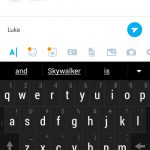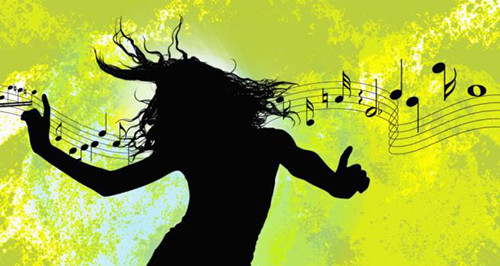I had to reset my Android smartphone recently because it developed a number of strange issues, like group-text messages taking 30+ seconds to send, and apps consuming a bunch of storage space even after they were uninstalled. In the past, I had the autocorrect typing feature disabled because I found that it created more problems for me than it solved, but it was turned back on since the feature is enabled by default and the phone reverted back to all of its default settings.
For shits and giggles, I decided to leave autocorrect on for a while so that I could assess how effectively its correction and prediction algorithms complement the user experience. To put it another way, I left it on so I would have an opportunity to better understand how well it works—or how well it doesn’t work, depending on one’s point of view.
I soon discovered a notable peculiarity of the word prediction feature: it frequently exhibits a preference for words relating to nerd culture  over common English words. This came to my attention while having a text-based conversation with a friend via Skype. I accidentally typed “Luke” when I intended to type “Like”. This is a common mistake that is impossible for the algorithm to correct: the letter “u” is adjacent to the letter “i” on a standard keyboard, and “Luke” is a valid word/name, so what could it possibly do?
over common English words. This came to my attention while having a text-based conversation with a friend via Skype. I accidentally typed “Luke” when I intended to type “Like”. This is a common mistake that is impossible for the algorithm to correct: the letter “u” is adjacent to the letter “i” on a standard keyboard, and “Luke” is a valid word/name, so what could it possibly do?
What surprised me though was that I found “Skywalker” appearing as the second of three word predictions offered by the algorithm, alongside the much more common English words “and” and “is”:
Suppose I was actually talking about a person named Luke—is it really okay that “Skywalker” is recommended over “was” or “would” or any other sentence-building words?
At first I wondered if society as a whole has become so strongly affected by pop-culture that the algorithm was actually correct in its prediction—that is, after typing the name “Luke”, people have been found to type “Skywalker” more frequently than “was” or “would”. If this is the case then that would mean there are more nerds on the planet in 2017 than non-nerds. Could this actually be true? Well, probably not… at least not yet. What’s more likely is that there is some mischievous programmer on the Android team at Google with a Darth Vader costume and large collection of battery operated light sabers who is having some fun at the expense of the rest of us.
I am not a fan of Star Wars and so I was quite irritated at this point. I started to wonder how much cumulative time might be lost by Android users because word prediction promulgates pop-culture instead of favoring utility. Google claims that there are more than 2 billion Android devices in use  , so if each person lost on average 2 seconds every day while texting due to biased and incorrect word suggestions then there would be ~46,296.3 days worth of lost time across the world every 24 hours.
, so if each person lost on average 2 seconds every day while texting due to biased and incorrect word suggestions then there would be ~46,296.3 days worth of lost time across the world every 24 hours.
I decided to test a few more words and names that have been assembled by the nerd-collective—“Mario”, “final” and “walking”. These were the results:
In each case, nerd culture is given preference over utility: “kart” and “bros” (which aren’t even real fucking words) are recommended for “Mario”; “fantasy” is recommended for “final”; and “dead” is recommended for “walking”.
So this is just one more reason for me to hate autocorrect  , and also one more reason for me to hate Star Wars
, and also one more reason for me to hate Star Wars  . Oh… and I don’t hate either as much as I hate the Church of Jedi
. Oh… and I don’t hate either as much as I hate the Church of Jedi  —these people would totally do something like this. I think we should lure all of these nutjobs into a space shuttle resembling the Millenium Vulcan and then shoot them into the darkest corner of space. (Perhaps this sounds cruel, but honestly… they would probably be okay with it.)
—these people would totally do something like this. I think we should lure all of these nutjobs into a space shuttle resembling the Millenium Vulcan and then shoot them into the darkest corner of space. (Perhaps this sounds cruel, but honestly… they would probably be okay with it.)
Needless to say, I have turned auto-correct back off.
Like this:
Like Loading...

![The text "Facebook Sucks" with a thumbs-down graphic. [Formatted]](http://unwisdom.org/chadspace/wp-content/uploads/facebook-000005-f500.jpg)
![Google search for "High Voltage lyrics" produces Linkin Park as top result (over AC/DC). [Thumbnail]](http://unwisdom.org/chadspace/wp-content/uploads/google-000000-t350.jpg)





